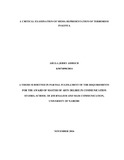| dc.description.abstract | This study investigated whether the media coverage of terrorism has resulted in moral panics in Kenya. The study used content analysis and discourse analysis research methodologies and key informants’ interviews. The target population for this research consisted of year 2015 articles in three top daily newspapers in Kenya: The Daily Nation, The Standard and The Star. The data was presented using both qualitative and quantitative methods. The study also interviewed editors, journalists, security personnel, moral gatekeepers and members of the public. The study was done in a period of six months. The study findings as enumerated in the fourth chapter indicate that the Kenyan media has effectively fanned public indignation and perpetuated what the study refers to as ’a moral panic’ about terrorism as a type of deviancy in the society. While one of the media’s role in a heterogeneous society like Kenya is to help maintain stability, moral panics perpetrated through the media threatens the social order of a society. The study also found out that moral panics have already occurred in sections of our society as is manifested through panicky emergency reaction by students at one of the institutions of higher learning (the University of Nairobi’s Kikuyu campus). The study also found out that moral panics can be created when audiences are filled with the sense that the enemy they are fighting is within and amongst them as often repeated by media. Furthermore, media coverage of the reaction that has been directed to a certain group or category of people and hostility they face increases their fear and anxiety and this heightens their experience of moral panics in society. The study therefore concludes that moral panics perpetrated through the media threaten the social order in Kenya. Moral panics caused by terrorism are problems characterised by reaction, through media representation and in political fora. Such reaction often dictates how the issue of terrorism has been dealt with in the Kenyan context. The study recommends that; first journalists should seek to continuously understand the desire of terrorists which is to promote fear in society and not to accord them any such opportunity. Secondly, the media and security forces should establish mechanisms of interaction where they define relevant terminologies to be used when reporting on terrorism, thus helping in limiting the use of words that have potential to cause moral panics | en_US |



